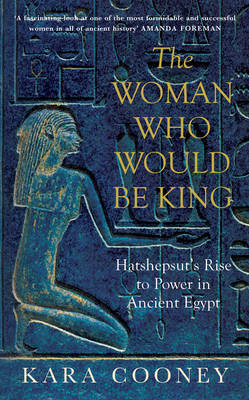Reviewed by inlibrisveritas on
So the first thing you need to understand before getting into biographies about Pharoahs, is that documents left behind about who they are as actual people are rare…we know what they did and if they were successful in their endeavors thanks to rigorous record keeping, but getting to know what these god-kings were actually like is nearly impossible. It’s all inference, and Kara is very clear that much of her speculation on motivations and drives are just that, speculation. They are formed with knowledge of how the Egyptians lived and what they thought were important codes of ethics, and of course by the documents, artifacts, and buildings they left behind.
With that in mind I can honestly say that Kara’s take on the mysterious woman is done very well. Many of the ideas she had were backed up with physical evidence and all within the realm of possibility, and nothing diverged into sensationalist gossip (King Tut’s “murder” anyone? -_- ), and through that evidence it really gives the reader something to think about. It’s one thing to watch a documentary going over Hatshepsut, but most of the time they focus on the fact that she was a woman and that her successor tried to erase her from visual history. But there is just so much to think about when it comes to her rule, and I think Kara covered pretty much everything starting from her childhood up to the end of her co-regent’s rule. She’s very concise in putting things together in order and then providing possibly explanations for Hatshepsut’s very calculated moves to ensure she was seen and respected despite her femininity. I knew quite a bit going in, but I have to say that Kara’s take on everything really opened up new topics I never heard about like God’s Wife and the possibility of her building projects being more than just religion but also as propaganda. We also get some incite on the people surrounding Hatshepsut like Senenmut (advisor/tutor), Thutmose I (father), II (husband), and III (nephew), and Neferure (her daughter). And we get to see the affect she had on subsequent Pharoahs like the rise in huge building projects and the quickly diminished role of women in power.
The writing is also excellent, it’s both informative and really easy to understand. Anything that isn’t self-explanatory is described, and there are plenty of annotations in the back that add addition information should you want it. It’s great for those who already know a lot about the subject and those who are just starting out. To top it off it’s not that large of a book, so you don’t have to worry about sitting down with a intimidating tome of ancient history.
Reading updates
- Started reading
- 30 November, 2015: Finished reading
- 30 November, 2015: Reviewed
